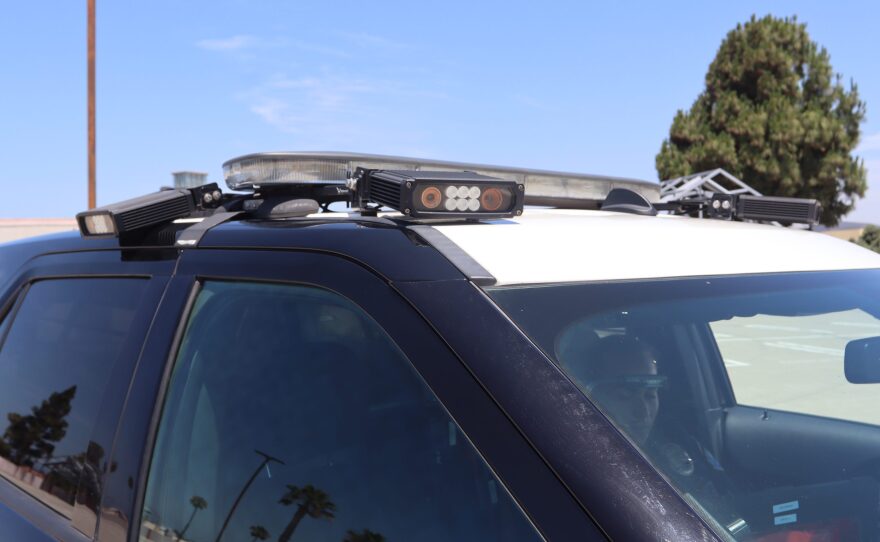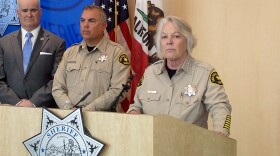A legal agreement in Northern California will have an impact on the way two police departments in San Diego County handle drivers’ location data.
Activists represented by the American Civil Liberties Union announced Wednesday a settlement in their lawsuit against the Marin County Sheriff for sharing data collected from automated license plate readers with out-of-state and federal agencies, in violation of two state laws.
As part of the agreement, Marin County and Sheriff Robert Doyle agreed to only share drivers’ location data with other law enforcement agencies in California and to pay $49,000 in attorney fees.
“This settlement is a victory for disfavored and marginalized people, including immigrants, who historically have been subjected to civil rights abuses through invasive surveillance by police,” said Vasudha Talla, Immigrants’ Rights Program Director at the ACLU of Northern California.
How police handle location data has become a point of contention for activists fighting for a number of causes, as many states across the country debate laws that criminalize women seeking abortion or parents obtaining gender-affirming care for their children.
An inewsource investigation in January revealed that half of San Diego County’s 10 local law enforcement agencies had been illegally sharing license plate data with other agencies across the United States. Small police departments in states as far away as Florida, New York and Connecticut have been given access to location data from drivers in San Diego County.
Police and city officials in Escondido and La Mesa initially doubled down, defending the practice of sharing data out of state and claiming they weren’t doing anything wrong, but later agreed to temporarily pause the practice.

After the Marin County settlement was announced, La Mesa police Capt. Matt Nicholass told inewsource that the department will end the practice altogether. But officials in Escondido aren’t ready to make that commitment.
License plate readers are little cameras mounted on top of patrol cars, or fixed objects such as light poles, that capture every plate that comes into view, extracting the time, date, location and sometimes a partial image of the vehicle. They automatically compare the plate number to a list of vehicles that police are looking for.
Because this surveillance technology has the power to collect sensitive, private information — such as a person’s daily routine or social network — state lawmakers in 2015 strengthened privacy protections for drivers and established strict rules for how police can use the technology, including who has access to the information collected.
State law says this data can only be shared with “public agencies,” which are defined as agencies in the state of California.
Activists call the cameras an indiscriminate data collection effort and point to nationwide examples of law-abiding citizens getting victimized thanks to police misconduct or misunderstanding of the technology.
“We are not against law enforcement and the use of surveillance to solve crimes,” said Yusef Miller, a social justice activist with the North County Equity & Justice Coalition and the Racial Justice Coalition of San Diego.
“But that technology needs to be governed, it needs to have transparency and it needs to have accountability for those who have misused that data.”
Police in Carlsbad, Coronado and Oceanside stopped sharing with all out-of-state agencies after questions from inewsource, but before the investigation was published in early January.
Officials in Escondido and La Mesa pushed back. Escondido’s city attorney, Michael McGuinness, sent an email challenging the accuracy of the investigation.
Their argument came down to the definition of public agency, saying that it would include other out-of-state agencies.
Six weeks later, police in Escondido and La Mesa decided to change course, but only to temporarily pause the practice. Officials in La Mesa said they wanted to wait for the results of the lawsuit against Marin County, and would consider resuming if it became clear that law enforcement was encouraged to share license plate data out of state.
But that’s not what happened.
The settlement affirms that Senate Bill 34 prohibits police in California from sharing license plate data with other out-of-state agencies.
Escondido police Chief Ed Varso previously said in an email that he and the city attorney continue to disagree with inewsource reporting, and he only decided to pause the sharing practice to strike a balance and maintain trust in the community. He added that he would let residents know should he decide to resume sharing data with out-of-state agencies.
After receiving news of the settlement, Varso told inewsource the department would decide to resume sharing data out of state only if “there is a revision to state law or another court case that further clarifies state law.”
Many California police departments are continuing to violate the law by sharing this sensitive information out of state, said Adam Schwartz, senior staff attorney with the Electronic Frontier Foundation, another agency representing the activists who brought the lawsuit in Marin County.
“They need to stop,” he said. “Moving forward we will be trying to identify police departments in California that continue to violate (the law) and we will ask them to stop, and if they don’t, perhaps we will sue them just as we have sued the Marin County Sheriff.”
The issue has become particularly pressing as anti-choice and anti-transgender officials in other states pursue people coming to California for healthcare.
“We can expect they’ll be turning to California police and saying, ‘We want your license plate data,’” he said.








